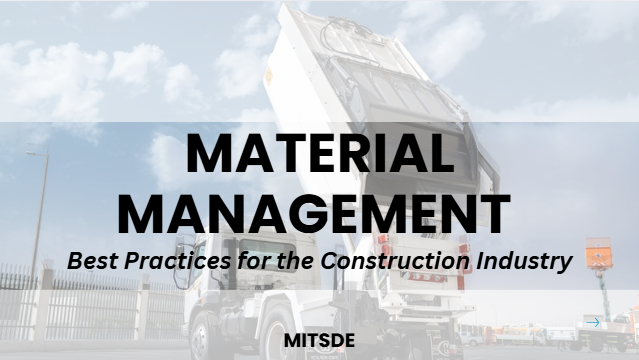
Construction projects are complicated, time-sensitive, and necessitate careful coordination, making efficient material management crucial. Mismanagement can result in delays, cost overruns, and lost resources. Construction organizations may increase productivity, save costs, and improve overall project outcomes by implementing best material management techniques. It can be life-changing for people who want to succeed in this field to pursue specialized education such as a PGDM in Material Management or comparable programs. Let’s look at major strategies and their implications for the building industry.
Understanding Material Management in Construction
In order to guarantee that materials are available when needed and to reduce waste, material management entails planning, acquiring, storing, and regulating commodities. It includes everything from obtaining raw materials to managing overstock and scrap. A streamlined material management procedure is critical to the success of any construction project because it assures the best use of resources and timely project completion.
Expert programs such as the PGDM Material Management Courses give professionals the tools they need to deal with these problems successfully. These courses address important topics including inventory control, procurement techniques, and supplier relationship management.
Best Practices in Material Management
1. Accurate Demand Forecasting
Demand forecasting is one of the most important components of material management. Accurate estimations prevent both overstocking and understocking, ensuring that materials are available when needed. Using modern software tools and approaches to forecast material requirements based on project schedules and historical data can greatly improve efficiency.
To increase forecasting accuracy, professionals with a Post Graduate Diploma in Material Management or similar training frequently become proficient in using these technologies.
2. Centralized Procurement System
Reducing redundancy, improving pricing discussions, and expediting the purchase process are all possible with the implementation of a centralized procurement system. Centralized solutions can improve transparency by making it easier to track material usage and expenses.
Students who enroll in a PGDM Course in Material Management get knowledge of procurement tactics that meet the demands of contemporary construction, equipping them to put in place systems that promote efficiency and cost savings.
3. Supplier Relationship Management
Having solid relationships with suppliers guarantees that high-quality materials are delivered on time. This includes negotiating fair conditions, keeping open communication, and cultivating long-term partnerships. Reliable suppliers can help reduce the risks connected with material shortages and quality difficulties.
Professionals with expertise in supplier management strategies who have completed the Top PG Diploma in Material Management programs are highly sought-after by construction firms.
4. Efficient Inventory Management
Keeping the right amount of goods on hand is essential. Excess inventory ties up cash and raises storage expenses, whereas insufficient inventory might cause project delays. Finding the ideal balance can be facilitated by implementing just-in-time (JIT) procedures and inventory management software.
The Best Material Management Courses educate students how to put systems in place that reduce waste and increase efficiency, with a focus on inventory control techniques.
5. Integration of Technology
Technological innovations like Building Information Modeling (BIM), the Internet of Things (IoT), and artificial intelligence (AI) are very beneficial to modern construction projects. These tools make it possible to track materials in real time, schedule efficiently, and make data-driven decisions.
Professionals can stay ahead in an increasingly digitalized sector by taking courses like the PGDM in Material Management, which frequently include modules on exploiting technology.
6. Training and Skill Development
Professionals must keep up with the most recent trends and practices because the construction industry is always changing. Investing in training programs, such as Top Material Management Courses, ensures that teams have the information and skills required to effectively apply best practices.
Importance of Education in Material Management
In the construction sector, material managers play a variety of roles that require a thorough understanding of inventory control, procurement, and logistics. Pursuing a PGDM Course in Material Management offers professionals:
- Specialized Knowledge: A thorough comprehension of material management concepts specific to building requirements.
- Practical Skills: Practical knowledge of instruments and methods that optimize material management procedures.
- Career Advancement: Improved qualifications that provide access to executive positions in construction firms.
- Networking Opportunities: Engaging with colleagues and industry experts to promote professional development.
The best PG Diploma in Material Management programs combine academic knowledge with practical applications, ensuring that graduates are well-prepared to face real-world difficulties.
Benefits of Effective Material Management
For the construction sector, putting best practices in material management into practice has various benefits, such as:
- Cost Savings: Effective inventory management and procurement cut costs and waste.
- On-time Project Completion: Delays are avoided by making sure materials are available when needed.
- Improved Quality: Materials that are handled and stored properly retain their quality, which leads to superior construction results.
- Sustainability: Eco-friendly operations are supported by optimal usage and a reduction in material waste.
Choosing the Right Educational Path
It is essential to choose the appropriate educational program for individuals who want to succeed in material management. Look for Top Material Management Courses that include both theoretical and practical training. Programs such as the PGDM in Material Management establish a solid foundation in logistics, procurement, and inventory control.
The Best Material Management Courses also focus on new developments like digital transformation and sustainability, equipping professionals to take the lead in a changing business.
Conclusion
An essential component of success in the construction sector is material management. Companies can improve their efficiency and profitability by implementing best practices such precise forecasting, centralized procurement, supplier relationship management, and technology integration. The knowledge required to succeed in this crucial subject is provided by taking a PGDM Course in Material Management for professionals wishing to progress in their jobs. With the correct knowledge and abilities, material managers may significantly improve project outcomes and contribute to their organizations’ growth.


